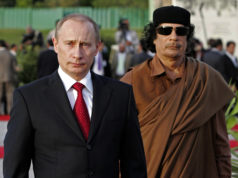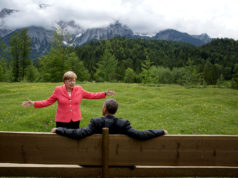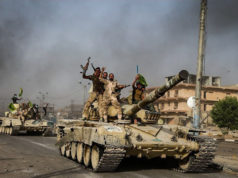After six months of fighting, Libya’s Transitional National Council, or TNC, opposed to Muammar Qaddafi’s 42-year reign, swept into the capital city of Tripoli on Sunday, where they were met with little resistance by the remainder of Qaddafi’s forces. Instead, the TNC rebels were welcomed by residents who celebrated with the fighters in Tripoli’s Green Square by waving the rebels’ flag and burning the green flag of the Qaddafi regime. “It’s over, frizz-head,” hundreds of Libyans chanted, mocking the leader and his curly hair.
Qaddafi’s days are numbered, but his regime has not toppled just yet. News sources Monday morning reported fierce battles around the Bab al-Aziziya headquarters where Qaddafi lived and his loyalists remain. Whether or not Qaddafi himself is still in Tripoli is unknown. NATO, for its part, announced that it will continue airstrikes against Qaddafi’s army in support of the rebels as they battle it out with the remainder of Qaddafi’s loyalists.

Libyans celebrating in Tripoli on Sunday night after TNC rebels took control of the capital. |
According to Mahmud Nacua, a top TNC diplomat, only five percent of Tripoli remains in Qaddafi’s hands as of Monday – a fact welcomed by world leaders. On Sunday evening, after news broke of the rebels’ advance, President Obama called on Qaddafi to “relinquish power once and for all.”
The end of Muammar Qaddafi would mean the end of one of the world’s foremost sponsors of international terrorism. Qaddafi was behind the 1986 bombing of a Berlin night club frequented by U.S. servicemen, and he was connected to, if not directly ordered, the bombing of Pan Am flight 103 that killed 270 people in 1988 over Lockerbie, Scotland. The Qaddafi regime was connected to the 1989 bombing of a UTA passenger plane over Niger that killed 170, and Qaddafi personally supported terrorist groups including, but not limited to, the Provisional IRA, the German Red Army Faction, Columbia’s FARC, and numerous Palestinian militant organizations including Yasser Arafat’s Fatah. His support for such groups ranged from financial, logistical, and operational assistance to providing them with a safe-haven in Libya.
Working within a coalition was the right choice for Washington, and perhaps the only choice. What lies ahead, however, remains an open question. Libyan society is largely tribal in nature; clan loyalties trump nationalism. Democratic institutions, therefore – currently non-existent in Libya – will have to be built from the ground-up over the years to come, which will most likely prove to be a frustrating task. Avoiding clan warfare and disarming the rebels in favor of creating a stable central governing body will likely prove to be an immediate challenge. In the long run, building a society where all Libyans are treated as equals under the law will be the true test of success. It can be done, however, and one can only hope that the Libyans are not afraid of asking Washington and her allies for assistance in putting their country back together.





